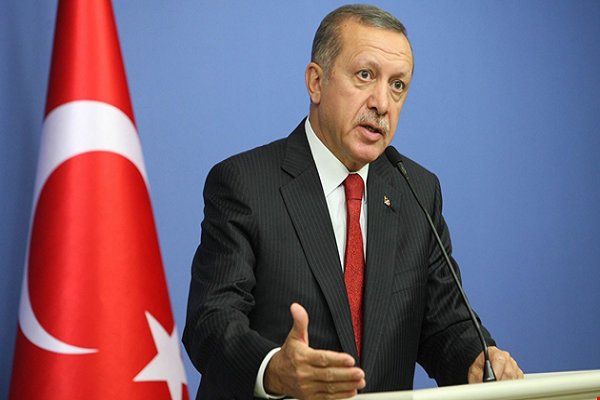Why Is Erdogan Angry?

TEHRAN _ Recent statements by Turkish government officials against Bashar al-Assad and the Syrian government have again made the stark confrontation between Ankara and Damascus public. This conflict has lasted for years between the two neighboring countries. The support of Erdogan and members of the AKP from ISIS and the al-Nusra Front in Syria over the past years is not something that can be ignored. Turkish government authorities who have made a major and strategic mistake in protecting Takfiri terrorism in Syria, continue to make the same mistake in confronting the Syrian crisis. Recent remarks by the Turkish PM indicate Ankara is still not going to correct its misplaced approach toward Damascus.
Speaking at the British regional symposium, the Turkish Prime Minister Binali Yildirim claimed that the Syrian government past practices, including the use of chemical weapons, would make it politically impossible for President Bashar al-Assad to be held as the Syrian president. It's difficult to forget about the past, and so it's hard to see Assad remaining in power.
"The actions of Bashar al-Assad, which is supported by Iran and Russia, mean that Ankara and other regional powers can't accept Assad's remaining in power as part of a peace deal," he said. However, he claimed that it's for Syrian citizens to decide on the future of their country, and mentioned that any decision by the Syrians that would lead to the survival of the Assad government, would force Ankara and its allies to sacrifice their own interests for the sake of protecting Syrian people.
These statements was made by the Turkish prime minister on the eve of the Geneva summit (regarding Syria) and on Tuesday last week. Negotiations between the delegation of Damascus and the Syrian opposition, which is called Geneva 8, were held in Switzerland last week. The head of the negotiating delegation on behalf of the Syrian government was "Bashar al-Jafari", the permanent representative of the country at the United Nations. The main question, however, is that why the Turkish prime minister, after the meeting, has once again opened up the language to criticize Bashar al-Assad and talk of his overthrow? There are some points here that can't be easily overlooked:
The first point is that the Turkish authorities consider themselves one of the main losers of the recent developments in Syria. Turkish authorities, like U.S. and Saudi officials, have called for the restoration of ISIS and other terrorist and takfiri groups in Syria. Turkey's support for some terrorist and takfiri groups, such as al-Nusra Front, is such that even some Turkish media have been openly criticizing Erdogan and his entourage (in recent years). Therefore, Turkey, like Saudi Arabia and the United States, sees itself as the loser of domestic developments in Syria. So the Turkish authorities are planning to make up for the defeat on the battlefield with gaining points in the diplomatic field.
Another point is that the Turkish authorities consider the Geneva summit to be a replacement for the Sochi Summit. During the Sochi Summit, Turkish authorities were in isolation because ISIS in Syria had lost its caliphate and power and was destroyed in Iraq. Consequently, Ankara had little maneuver during the recent Sochi Summit. Under such circumstances, Turkey is trying to compensate for its constraints in joint meetings with Iran and Syria during the Geneva summit. But the fact is that Turkish officials, especially President Rajab Tayyip Erdogan, have lots of miscalculations here too.
The newspaper "Kommersant", Moscow Printing, wrote in an analysis: Russian President Vladimir Putin met with Turkish President Recep Tayyip Erdogan on November 13 at his resorts in Sochi, in southern Russia. According to news sources, Erdogan seems to have failed to achieve the goal he had traveled to Russia, and failed to take any points from the Russian President on Syria. The Turkish president, before flying to Sochi, spoke about his goals of this trip. He disclosed that Russia and the United States should withdraw their troops from Syria and empty their military bases so that free elections could be held in Syria. Of course, the logic of Erdogan is understandable: in that case, only Turkish troops will remain in Syria and they can feel relieved!
However, by the end of Sochi meeting, Erdogan found that he was defeated by the resistance on the diplomatic field, just like it was defeated in the military field. What is certain is that the main way to reduce the cost of Turkey's heavy defeat in Syria is the recognition of the Syrian government and the winning of the resistance front by Turkey.
As Erdogan escapes the facts in Syria, he will face rising costs for this defeat. In other words, Erdogan needs a U-turn in his foreign policy and regional policies. So far, many Turkish politicians, and especially people like former Turkish President Abdullah Gul, have warned Erdogan clearly that continuing his misconduct in Syria will cost a lot to Turkey's foreign policy.However, the Turkish president continues to insist on his wrong approach towards Syria.
Obviously, it is already too late to accept the facts in Syria (by Erdogan and the AKP), but accepting these facts is a prerequisite for reducing the cost of Ankara's failure in Damascus. Will Erdogan and other officials in the Justice and Development Party be able to retreat from their dangerous and false policy towards Damascus in coming weeks? Or are we to witness increased costs for the failure of Turkey in Syria? These questioned will be soon answered.
Leave a Comment